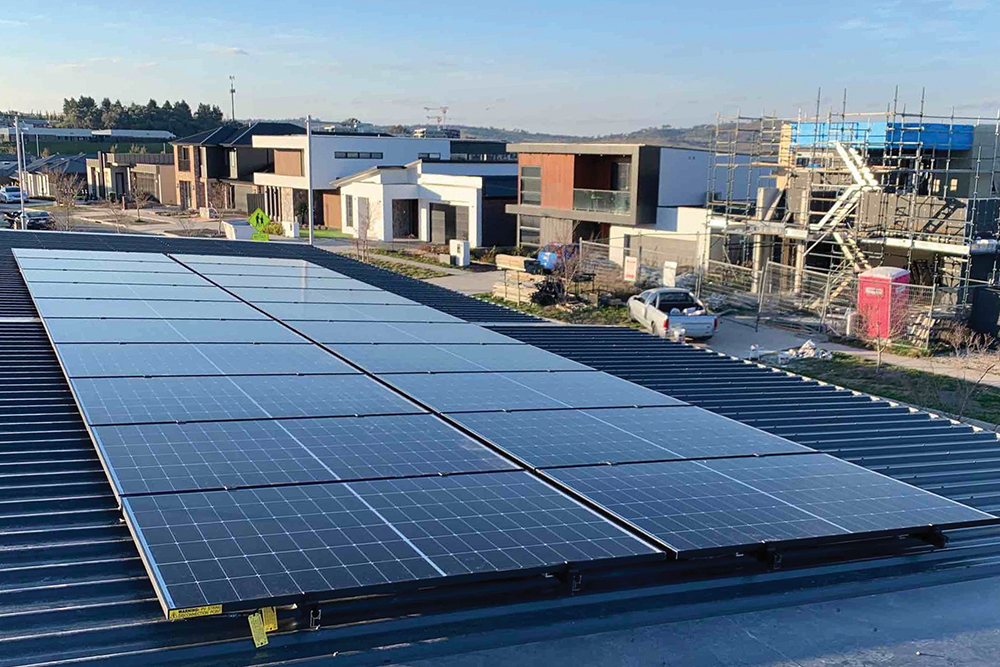
Low-income households, renters, and people in regional and rural areas could be among those who benefit most from greater investments in solar energy projects.
Environment and community groups issued their assessments on Tuesday after Energy Minister Chris Bowen revealed he had directed the Australian Renewable Energy Agency (ARENA) to accelerate solar electrification projects.
Organisations including the Australian Council of Social Service and Rewiring Australia welcomed the announcement, but also urged ARENA to focus on households in greatest need of financial assistance to make the biggest impact.
Mr Bowen used ministerial powers to direct ARENA’s board to consider funding solar panels and home batteries after striking a deal with crossbenchers in exchange for support on Labor’s Future Made in Australia legislation.
The agency will look at funding a project in every state and territory as part of the directive, including at least one in an Indigenous community and one in a low socio-economic area.
Projects would be modelled off the North Wollongong community electrification testbed funded by the renewable energy agency in 2024.
Projects will still be subject to a final independent assessment by the agency’s board.
The plan will allow chosen suburbs to act as pilots for regulatory changes needed to scale up renewable energy use and scope out how government support can help achieve electrification, independent senator David Pocock said.
“In this cost-of-living crisis one of the highest impact, non-inflationary things governments can do is to help households electrify and deliver thousands in permanent power bill relief,” Senator Pocock said.
The Future Made in Australia legislation, which leverages billions of dollars to invest in renewable energy and critical resources needed for such technology, missed an opportunity to support household electrification, Senator Pocock said.
Households renting properties and struggling with rising energy bills stood to benefit the most from additional solar projects, Australian Council of Social Service (ACOSS) chief executive Cassandra Goldie said, and urged the agency to strongly consider disadvantaged groups.
More efficient homes with electric appliances and solar power, she said, could save up to $3487 annually on bills.
“This is good news for people living in hot boxes, struggling with heatwaves and high energy bills,” Ms Goldie said.
“People experiencing financial disadvantage are more likely to live in poor energy performing homes and, as a result, more likely to get sick in summer heat, face high energy bills and go without food, medicines and other essentials to manage their bills.”
Parents for Climate also welcomed moves to tackle the up-front cost of solar investments for households, while Rewiring Australia chief scientist Dr Saul Griffith said more tests could deliver vital insights to expanding renewable energy adoption.
“Rural, regional and suburban households have the most to gain from electrification but more research is needed to understand how to make it easy and affordable for everyone,” Dr Griffith said.
“These pilots deliver rich insights into how consumers and tradies use and install technologies.”
The renewable energy agency has helped fund more than 660 projects to the tune of $2.25 billion, ranging from early-stage research and prototyping to later-stage developments.
The minister wrote to the agency in late 2024 but only revealed the direction on Tuesday.
Who can be trusted?
In a world of spin and confusion, there’s never been a more important time to support independent journalism in Canberra.
If you trust our work online and want to enforce the power of independent voices, I invite you to make a small contribution.
Every dollar of support is invested back into our journalism to help keep citynews.com.au strong and free.
Thank you,
Ian Meikle, editor









Leave a Reply